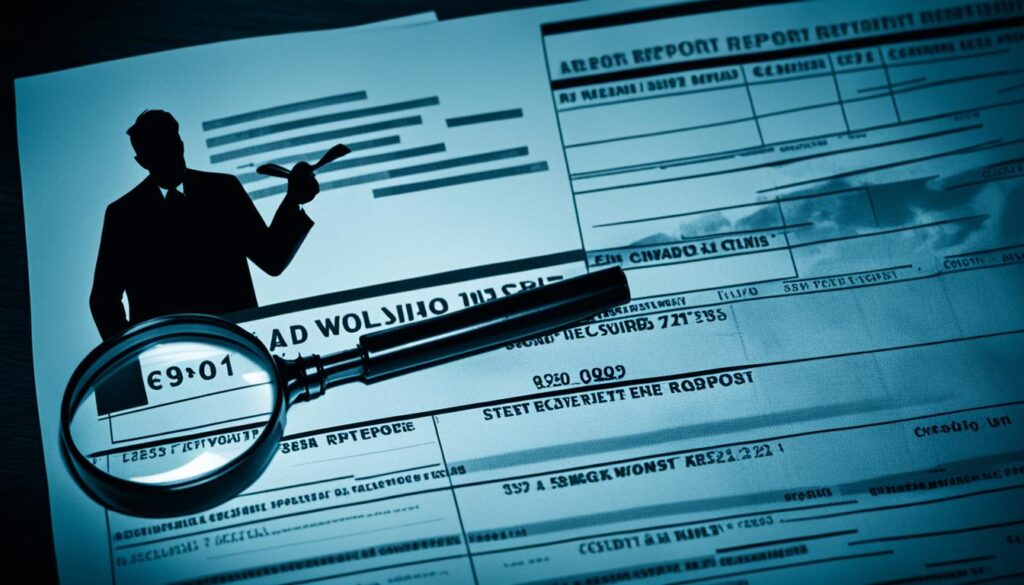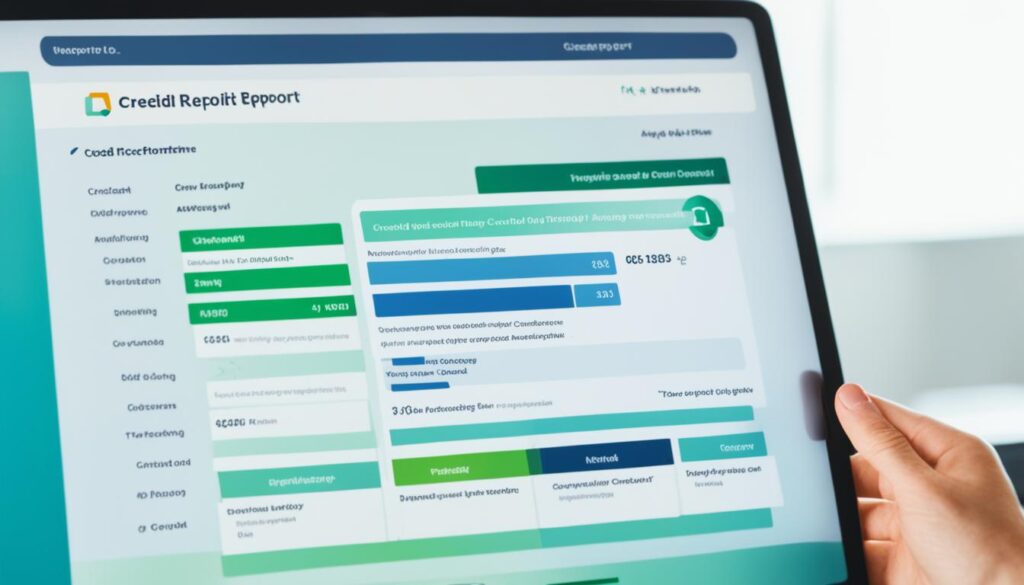Your credit report is a crucial document that impacts your ability to borrow money, get a job, rent a home, and obtain insurance. Inaccurate information on your credit report can negatively affect your financial opportunities and creditworthiness. It’s essential to regularly review your credit reports to ensure the information is accurate. If you notice an error, you have the right to dispute the item on your credit report for free online, by phone, or by mail. This guide will provide you with essential tips and steps to effectively dispute your credit report online.
Key Takeaways
- Regularly check your credit reports to identify and address any errors or inaccuracies.
- Understand the importance of accurate credit reports and how they impact your financial opportunities.
- Learn the step-by-step process to dispute credit report errors online for a quick and convenient resolution.
- Familiarize yourself with the investigation and resolution process followed by credit bureaus when addressing disputes.
- Explore the potential outcomes of a credit report dispute and take further actions if you’re unsatisfied with the result.
Importance of Accurate Credit Reports
Your credit report is a crucial document that can significantly impact your financial opportunities. It plays a vital role in your ability to borrow money, secure a job, rent a home, and obtain insurance. Inaccurate or incomplete information on your credit report can lead to higher interest rates, denied applications, and missed opportunities, ultimately affecting your creditworthiness.
The importance of accurate credit reports cannot be overstated. Lenders, employers, landlords, and insurance providers often use your credit report to assess your financial responsibility and trustworthiness. Inaccurate credit report information can negatively impact your financial opportunities and have far-reaching consequences on your life.
Consequences of Inaccurate Credit Report Information
- Denied loan applications or higher interest rates
- Difficulty securing a job or renting a home
- Increased insurance premiums or coverage limitations
- Damaged credit score and reduced creditworthiness
“Inaccurate information on your credit report can haunt you for years, making it harder to achieve your financial goals.”
It’s crucial to regularly review your credit reports to ensure the information is accurate and up-to-date. By addressing any errors or inaccuracies, you can protect your impact of credit reports on financial opportunities and maintain a healthy financial future.
Check Your Credit Reports Regularly
Regularly checking your credit reports is essential for maintaining your financial health. Your credit report is a comprehensive record of your credit history, and it plays a crucial role in determining your creditworthiness. By monitoring your credit report for errors, you can catch and address any inaccuracies before they negatively impact your ability to borrow money, rent a home, or even get a job.
In the United States, you are entitled to a free copy of your credit report from each of the three major credit bureaus (Experian, Equifax, and TransUnion) once every 12 months. This means you can check your credit reports regularly and stay on top of any changes or potential issues. Additionally, during the COVID-19 pandemic, you can access your Equifax credit report for free once a week through 2026, making it even easier to review your credit report and ensure its accuracy.
Regularly reviewing your credit reports can help you identify and address any errors or inaccuracies before they negatively impact your creditworthiness. By taking the time to monitor your credit report, you can catch and resolve issues early, ensuring that your financial opportunities remain open and accessible.

“Regularly reviewing your credit reports is the best way to ensure your financial future remains bright.”
Remember, the importance of reviewing credit reports cannot be overstated. By making it a habit to check your credit reports regularly, you can take control of your financial well-being and stay ahead of any potential issues.
Understanding Negative but Accurate Information
While it’s essential to dispute any inaccurate or incomplete information on your credit report, you should also be aware that some negative but accurate information may remain on your report for a set period of time. This includes items like late payments, collections, and bankruptcies. Even if the negative information is factually correct, it will eventually be removed from your credit report after a certain number of years, typically 7 to 10 years.
The impact of accurate negative information on your credit report can be significant, as it can lower your credit scores and make it more difficult to obtain loans, credit cards, or even secure employment. However, it’s important to understand that the timeline for the removal of this information is governed by federal laws, such as the Fair Credit Reporting Act (FCRA).
Under the FCRA, most negative but accurate information, such as late payments and collections, can remain on your credit report for up to 7 years. More severe negative information, like bankruptcies, can remain on your report for up to 10 years. It’s crucial to review your credit report regularly to ensure that the negative information is being updated and removed as required by law.
| Type of Negative Information | Timeline for Removal |
|---|---|
| Late Payments | Up to 7 years |
| Collections | Up to 7 years |
| Bankruptcies | Up to 10 years |
While you may not be able to remove accurate negative information from your credit report immediately, it’s important to understand the timeline for its removal. This knowledge can help you plan your financial strategy and work towards improving your credit over time.

Disputing Errors with Credit Bureaus
If you’ve discovered an error on your credit report, the first step is to dispute the inaccurate information directly with the credit bureaus. The credit bureau dispute process is a crucial step in maintaining the accuracy of your credit history. By following the proper steps, you can effectively dispute credit report errors with the credit bureaus and improve your creditworthiness.
To begin the dispute process, you can contact each of the three major credit bureaus – Experian, Equifax, and TransUnion – online, by mail, or by phone. When submitting a dispute, be sure to clearly explain what you believe is wrong, why it’s incorrect, and provide any supporting documentation to back up your claim.
- Identify the specific error or inaccuracy on your credit report.
- Gather any relevant evidence, such as bills, receipts, or correspondence, to support your dispute.
- Contact the credit bureaus directly and initiate the dispute process, either online, by mail, or by phone.
- Clearly explain the nature of the error and why it is inaccurate.
- Submit any supporting documentation to the credit bureaus.
- Wait for the credit bureaus to investigate your dispute, which they are required to do within 30 days.
- Review the results of the investigation and follow up if the error is not corrected.
By taking the time to dispute credit report errors with the credit bureaus, you can ensure that your credit report accurately reflects your financial history, which can have a significant impact on your ability to obtain credit, secure a job, or rent a home.

| Credit Bureau | Dispute Method | Contact Information |
|---|---|---|
| Experian | Online, Mail, Phone | www.experian.com/disputes, P.O. Box 4500, Allen, TX 75013, 1-888-397-3742 |
| Equifax | Online, Mail, Phone | www.equifax.com/personal/credit-report-services/credit-dispute, P.O. Box 740256, Atlanta, GA 30374, 1-866-349-5191 |
| TransUnion | Online, Mail, Phone | www.transunion.com/credit-disputes/dispute-your-credit, P.O. Box 2000, Chester, PA 19016, 1-800-916-8800 |
By following the steps outlined above and utilizing the credit bureau dispute process, you can effectively address and resolve any errors or inaccuracies on your credit report. Remember, maintaining an accurate credit history is essential for your financial well-being, so take the time to dispute credit report errors with the credit bureaus.
Disputing with Information Furnishers
Disputing inaccurate information on your credit report doesn’t stop at the credit bureaus. You can also take action by directly contacting the companies that originally reported the erroneous data, known as “data furnishers.” This includes your bank, credit card issuer, or other creditors. By disputing directly with the credit report furnishers, you can increase your chances of resolving any credit report dispute issues.
The credit report dispute process with creditors involves sending a detailed dispute letter to the furnisher, providing the same information and supporting documentation you would use for a credit bureau dispute. The furnisher is then legally required to investigate the dispute and report the results back to the credit bureaus.
Here are the key steps to dispute errors with companies reporting information:
- Identify the specific furnisher(s) reporting the inaccurate information.
- Gather all relevant documentation, such as billing statements or payment receipts, to support your dispute.
- Draft a dispute letter detailing the inaccurate information and your reasons for disputing it.
- Send the dispute letter to the furnisher’s address for handling consumer disputes.
- Monitor the furnisher’s investigation and response, which they must provide within 30-45 days.
- If the furnisher does not resolve the issue, you can follow up with the credit bureaus to ensure the inaccurate information is removed or corrected.
By taking the time to dispute inaccurate information with data furnishers, you can ensure your credit report accurately reflects your financial history and protects your creditworthiness.

“Disputing errors with data furnishers is a critical step in maintaining the accuracy of your credit report.”
guide to disputing credit report online
The credit bureaus offer several options for disputing errors on your credit report, including online, by mail, and by phone. Among these, filing your dispute online may be the fastest and most convenient method. Each credit bureau has its own online dispute platform where you can submit the details of the error and upload any supporting documentation.
The Online Credit Report Dispute Process
The online credit report dispute process typically takes less time to resolve compared to disputes submitted by mail or phone. This is because the credit bureaus can more efficiently investigate and process online disputes. The steps to dispute credit report errors online include:
- Access the credit bureau’s online dispute platform.
- Identify the specific item on your credit report that you want to dispute.
- Provide details about the error, such as the account number, creditor name, and why you believe it is inaccurate.
- Upload any supporting documentation, such as payment receipts or correspondence with the creditor.
- Submit your online dispute and track its progress through the bureau’s dispute resolution process.
The benefits of using the online credit report dispute process include:
- Faster resolution compared to mail or phone disputes.
- Ability to easily upload supporting documents digitally.
- Convenient 24/7 access to the dispute platform.
- Ability to monitor the status of your dispute online.
By taking advantage of the online credit report dispute process, you can efficiently address any errors or inaccuracies on your credit report and protect your financial well-being.
“Accurately managing your credit report is essential for maintaining a healthy financial future. The online dispute process makes it easier than ever to address any issues quickly and conveniently.”
Investigation and Resolution Process
When you submit a dispute to the credit bureaus regarding inaccurate information on your credit report, the credit report dispute investigation process begins. The credit bureaus are required to investigate the issue and contact the company or “furnisher” that provided the questionable information.
The furnisher, in turn, must investigate the dispute and report the results back to the credit bureau. This entire credit report dispute resolution process must be completed within 30 days, and in some cases, up to 45 days if you provide additional documentation to support your claim.
Once the investigation is complete, the credit bureau will update your credit report accordingly. This could mean the information is verified as accurate, updated, or deleted entirely. The timeline for credit report dispute resolution can vary, but the credit bureaus are required to act swiftly to ensure the integrity of your credit report.
| Step | Description | Timeline |
|---|---|---|
| 1. Submit Dispute | You file a dispute with the credit bureau regarding inaccurate information on your credit report. | – |
| 2. Credit Bureau Investigation | The credit bureau contacts the furnisher who provided the disputed information and investigates the issue. | 30-45 days |
| 3. Furnisher Investigation | The furnisher must investigate the dispute and report the findings back to the credit bureau. | 30-45 days |
| 4. Credit Report Update | The credit bureau updates your credit report based on the results of the investigation, which may include adding, updating, or deleting information. | 30-45 days |
By understanding the credit report dispute investigation process and the steps taken by the credit bureaus to resolve disputes, you can ensure that your credit report remains accurate and up-to-date, ultimately protecting your financial well-being.
Tracking Your Dispute Status
Monitoring the status of your credit report dispute is crucial for ensuring a timely resolution. The credit bureaus provide various avenues for you to track the progress of your dispute, allowing you to stay informed and take appropriate actions as needed.
One of the easiest ways to track your credit report dispute status is by logging into your account with the credit bureau where you filed the dispute. The credit bureaus typically offer an online platform that allows you to view the current status of your dispute, such as whether it is open, under investigation, or if any updates have been made to your credit report.
- You may also receive email or other notifications from the credit bureaus when there are updates to the status of your dispute.
- Closely monitoring the progress of your dispute can help ensure it is resolved in a timely manner and that any necessary changes are reflected on your credit report.
By tracking credit report dispute status and monitoring credit bureau dispute status updates, you can stay on top of the investigation process and make sure your credit report dispute is being addressed effectively.
“Keeping a close eye on the status of your credit report dispute is essential for ensuring a successful outcome and maintaining the accuracy of your financial information.”
Remember, the credit bureaus are required to investigate your dispute and provide you with the results within a specific timeframe. By diligently monitoring the progress of your credit report dispute, you can hold them accountable and take further action if necessary.
Potential Dispute Outcomes
The outcome of your credit report dispute can have a significant impact on your credit scores. When you initiate a dispute, the credit bureaus will investigate the information in question and provide one of several possible resolutions. Understanding these potential dispute outcomes is crucial as you work to ensure the accuracy of your credit report.
Potential Dispute Resolutions
After investigating your dispute, the credit bureau may take one of the following actions:
- Information added: The credit bureau may add new, accurate information to your credit report based on the evidence provided in your dispute.
- Information updated: Inaccurate information may be updated to reflect the correct details on your credit report.
- Information deleted: If the credit bureau determines that the disputed information is indeed inaccurate, they will remove it from your credit report.
- Information verified as accurate: The credit bureau may confirm that the disputed information is correct and leave it on your credit report.
The impact of these dispute outcomes on your credit scores can vary significantly. Removing negative, inaccurate information can lead to an improvement in your scores, while verifying accurate but negative data may result in no change or even a decrease in your scores.
| Dispute Outcome | Potential Impact on Credit Scores |
|---|---|
| Information added | Depends on the nature of the new information |
| Information updated | Depends on the changes made to the information |
| Information deleted | Scores may improve if negative information is removed |
| Information verified as accurate | Scores may remain the same or decrease if negative information is confirmed |
By understanding the possible credit report dispute outcomes and their impact on credit scores, you can better prepare for the results of your dispute and take appropriate next steps to improve your credit report and creditworthiness.
Further Actions if Unsatisfied
If you’re not satisfied with the outcome of your credit report dispute, there are additional steps you can take to resolve any unresolved credit report errors. First, you can reach out directly to the company or “furnisher” that originally provided the disputed information and provide them with evidence that their records are inaccurate. This gives them an opportunity to investigate and correct the issue.
Another option is to request that the credit bureau add a statement of dispute to your credit report. This statement will be included when your report is shared with lenders and other interested parties, ensuring they are aware of the ongoing credit report dispute.
If the issue remains unresolved, you may need to consider filing a complaint with the Consumer Financial Protection Bureau (CFPB) to further escalate the credit report dispute. The CFPB can investigate the matter and help facilitate a resolution, potentially leading to the removal or correction of the disputed information.
“Taking proactive steps to address additional steps if unsatisfied with credit report dispute outcome can be crucial in protecting your financial well-being and creditworthiness.”
Remember, perseverance and attention to detail are key when navigating the process of resolving unresolved credit report errors. By exploring all available options to escalate credit report disputes, you can increase your chances of achieving a favorable outcome and maintaining an accurate credit profile.
Conclusion
Disputing errors on your credit report is a crucial step in maintaining accurate and up-to-date credit information. By regularly reviewing your credit reports and promptly addressing any inaccuracies, you can protect your creditworthiness and financial opportunities. This guide has provided you with the essential steps to effectively dispute credit report errors online, including how to initiate the process, track the status, and understand potential outcomes.
Remember, staying vigilant and proactive about the information in your credit reports is key to achieving and maintaining a healthy financial profile. The summary of the credit report dispute process, the importance of maintaining accurate credit reports, and the tips for ongoing credit report monitoring are all essential elements to ensure your financial well-being.
Take control of your credit and safeguard your financial future by actively managing your credit reports. With the right knowledge and diligence, you can navigate the credit dispute process and maintain the creditworthiness you deserve.
FAQ
What is the importance of having an accurate credit report?
How often should I review my credit reports?
What if I find negative but accurate information on my credit report?
How can I dispute errors on my credit report?
Can I also dispute errors with the companies that reported the information?
What are the benefits of disputing credit report errors online?
How long does the credit report dispute process take?
How can I track the status of my credit report dispute?
What are the possible outcomes of a credit report dispute?
What can I do if I’m not satisfied with the outcome of my credit report dispute?
Source Links
- How do I dispute an error on my credit report? | Consumer Financial Protection Bureau – https://www.consumerfinance.gov/ask-cfpb/how-do-i-dispute-an-error-on-my-credit-report-en-314/
- Disputing Errors on Your Credit Reports – https://consumer.ftc.gov/articles/disputing-errors-your-credit-reports
- How to Dispute Credit Report Information – Experian – https://www.experian.com/blogs/ask-experian/credit-education/faqs/how-to-dispute-credit-report-information/

